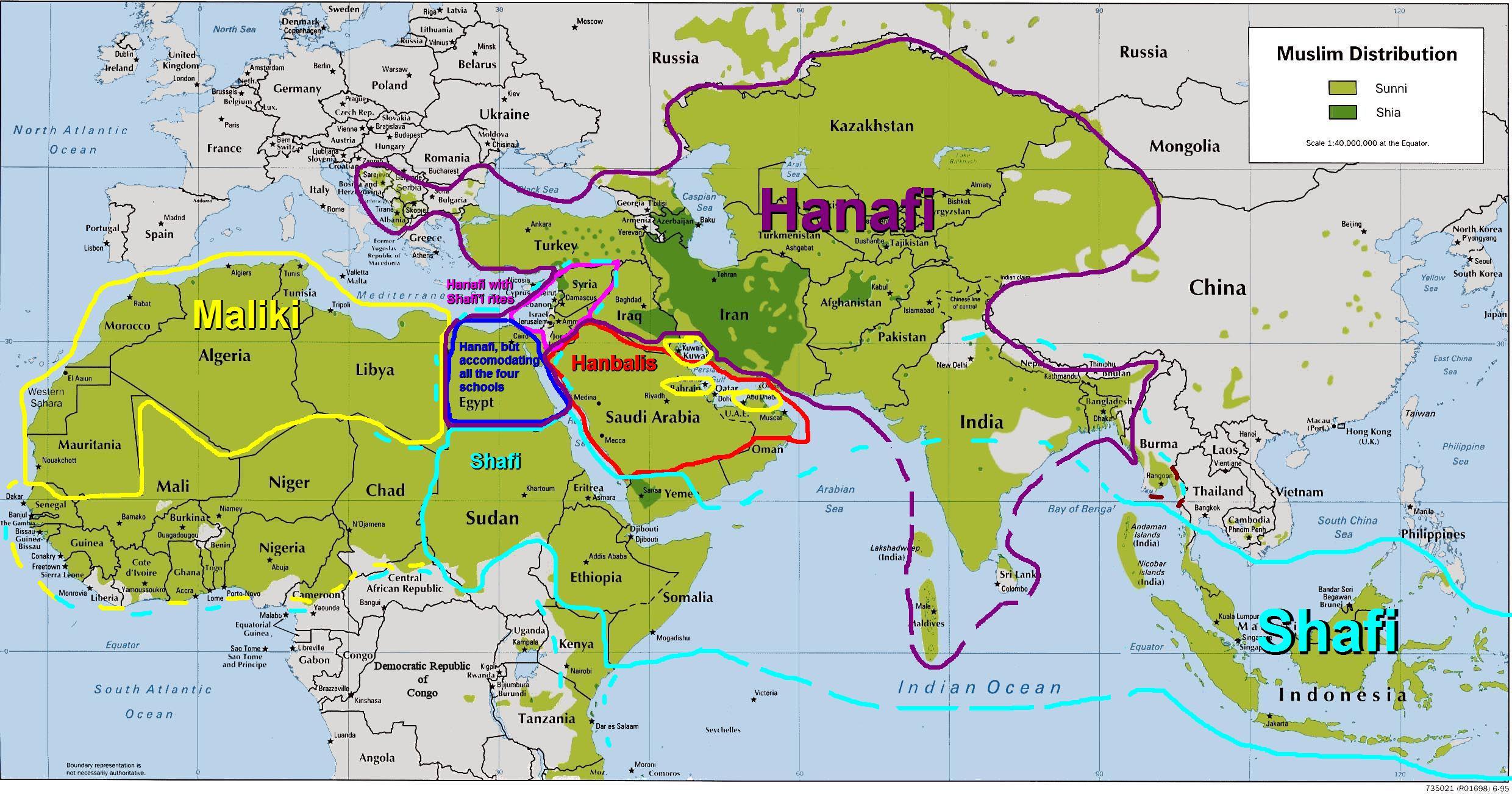by Sidi Harun Hanif
Translation of the Introduction to “Radiant Benefits of the Biographies of the Hanafis”
(Fawaid Bahiyya fi Tarajim Hanafiyya) by Imam ‘Abdul Hayy Lucknowi, may Allah sanctify his soul and surround him with His mercy.
Know that the essence of our prophet Muhammad, upon him be peace and blessings, is like the source of fountain springs from which rivers of knowledge flow. The first of those who channelled and set in motion this knowledge were the rightly guided Companions, in particular the caliphs. In knowledge, they are all like the stars; if you were to follow any one of them you will be guided. They are the true inheritors of the Prophet, upon him be peace and blessings, and his representatives in spreading the religion.
From them, the knowledge then flowed to those who benefited from them, and then to their followers. Amongst them, according to the most correct and established position, are our greatest Imam and the foremost of those who are followed, Abu Hanifa, N’uman ibn Thabit.
This knowledge then passed to their followers, and then to their successors who include in their ranks mujtahid imams (1). From them, it passed on to their followers, amongst whom were fuqaha (2) and muhaddithun (3).
This system will remain until the Day of Judgement. Every one of them endeavoured their utmost to spread knowledge and to pass it on to intellectual masters, through reminders, writings, orally and by facilitating understanding. May Allah shower His vast mercy upon them and shade them with clouds of His perfect favours. Had it not been for them, we would never have been guided and would have remained upon what we were upon.
Know that the affair is not, as is imagined by corrupt, ignorant people with dull minds, that the differences between the Companions and mujtahidun (4) of this Community has complicated matters and made the task more difficult. The truth is that these differences are a mercy for this Community, having made the religion easy and removed any difficulty from it. Equally, it should not be imagined that if everything had sprung from the source of one river, the matter would have been easier than it is, having sprung from a variety of sources.
These various schools of the imams and mujtahidun of this Community all connect back to the rivers of the Companions. These, in turn, are connected to the source; the recipient of the Divine message, upon him be peace and blessings.
Thus, every one of the schools is on guidance and whoever follows anyone of them is guided. However, whomsoever imagines that only one of them is on guidance, whilst the remainder are misguided, has fallen into the pit of misguidance.
Know that many mujtahidun, with groups of scholars following them, have appeared in this Community. Every one of them spent their time channelling the rivers of Sacred Law and expended their efforts in determining the upright path. In fact, no century has passed without the appearance of reformers mujaddidun (5), with their followers, nor does an age pass by without the appearance of a group of mujtahidun across the lands, even if they themselves may seem to be mere followers.
This process is from the complete favour of Allah to his slaves, which requires constant gratitude towards Him. By them, we are guided, provided with sustenance, blessed with rain and remain on the straight path.
However, from all of these, only four schools have become universally accepted with their understanding having been archived, their methods having been identified and their proofs having been clarified. With the passage of time they have received acceptance from intellectual masters across the lands. They are Abu Hanifa, Malik, Ahmad and Shafi’i.
The first of these was the first. The second was his contemporary. It is said that the first related a little from the second. It is also said that, in fact, the second was a student of the first. The third was a student of the fourth. The fourth was a student of the second and some of the students of the first.
Amongst the remaining mujtahidun, who either preceded or came after the aforementioned four, some never had any followers and thus complete benefit was never gained from them. Others did have groups of followers and their schools spread through their documented books. However, after a short period of time these schools disappeared, and no narrations remained from them. As a consequence, some have said that there is no accepted path except for these four paths. However, this claim is disputed.
Most people, then, began to follow these four schools, with very few taking from any other way. The school of Ahmad spread in areas within Baghdad. However, in other places its spread was less than the other schools. The school of Malik spread throughout North Africa and parts of Hijaz. The school of Shafi’i spread through most of Hijaz, Yemen, parts of India and the border regions of Bengal, parts of the border regions of Khurasan and Turan. The school of Abu Hanifa spread to distant lands and many cities. These include areas of Baghdad, Egypt, Eastern Europe, Balkh, Bukhara, Samarqand, Isfahan, Shiraz, Azerbaijan, Jurjan, Zinjan, Tus, Bistam, Istiribad, Marghaynan, Farghana, Damghan, Khawarizm, Ghazna, Karman, most of India, Sindh and Bengal, parts of Yemen and other areas.
Each one of them spread the knowledge of their imam through dictating, teaching and writing. This system will remain until the appearance of the mujtahid mutlaq (6), the last of the true scholars, the rightly guided one, Muhammad ibn ‘Abdullah, the Mahdi. ‘Isa, peace and blessings be upon our Prophet and upon him, will also descend, and from that point on, following the schools will no longer remain valid. Their rules will be based on taking from the Qur’an, sunna and by extracting from the Prophetic example based on the correct opinion. This has been stated by leading scholars in their notes and books such as ibn Hajar ‘Asqalani, Jalal Suyuti, Muhammad ibn ‘Abd Rasul Barzanji, ‘Ali Qari and Shaykh Muhyiddin ibn ‘Arabi. As for the statement of some ignorant bigots that ‘Isa and the Mahdi will follow Abu Hanifa and will not, in any way, oppose his school: it is absurd, as has been stated by legal and spiritual masters. In fact, it is undoubtedly an attempt at guessing the unknown.
Know that the followers of the four imams have become known by their being affiliated to these great imams, from whence we have the titles Hanafi, Shafi’i, Maliki and Hanbali. This allows for each one to be clearly identified and known from the other. The reality is that each one of these schools is from the Prophet, upon him be peace and blessings, because, each one, by treading the path of their imam is treading the Prophetic path, and drinking from that greatest of all sources. Whoever disdains affiliation to any one of these agreed upon schools, and regards them as being in opposition to Sacred Law, acts rashly and wanders blindly. Such a person is ignorant and will spread ignorance, is astray and will lead others astray.
Notes:
1. The mujtaihid is a scholar qualified to issue expert legal opinion.
2. Fuqaha is the plural of faqih. Faqih is a scholar of Islamic law. 3. Muhaddithun is the plural of muhaddith. Muhaddith is a scholar whose expertise is in the Prophetic traditions.
4. Mujtahidun is the plural of mujtahid, the definition of which has preceded.
5. Mujaddidun is the plural of mujaddid who is the one who returns people back to the Prophetic way.
6. Mujtahid mutlaq is the absolute mujtahid who is not restricted in any way in law.



